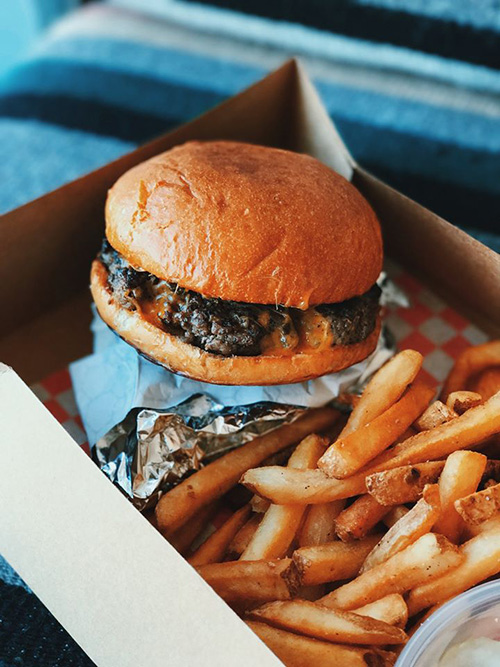
Can I Get COVID-19 From Take-Out?
With the COVID19 pandemic,many restaurants are only open for delivery and to-go orders. Many are concerned about the safety of their food and the packaging, and may ask, Can I get COVID-19 from takeout?"
TEXARKANA, Ark. –
Due to the COVID-19 pandemic, many restaurants are only open for delivery and to-go orders, in order to remain open during the shut-down. However, many are concerned about the safety of takeout, delivery, or drive through foods and their packaging, and may be asking if we can get COVID-19 from takeout.
According to the U.S. Food and Drug Administration, currently there is no evidence of food or food packaging being associated with the transmission of COVID-19.
Unlike foodborne gastrointestinal (GI) viruses like norovirus and hepatitis A, that often make people ill through contaminated food, SARS-CoV-2, which causes COVID-19, is a virus that causes respiratory illness. Foodborne exposure to this virus is not known to be a route of transmission. Few viruses can survive basic food safety measures, and even fewer can endure the acid in the human digestive system.
This virus is thought to spread mainly from person-to-person. This includes between people who are in close contact with one another, within about 6 feet, and through respiratory droplets produced when an infected person coughs or sneezes. These droplets can land in the mouths or noses of people who are nearby, or possibly be inhaled into the lungs.
The likelihood of an infected person contaminating food is low and the risk of catching the virus that causes COVID-19 from a package that has been moved, shipped, and exposed to different conditions and temperature is also low.
Continue to consistently use social distancing when ordering takeout food and delivery by reducing any physical contact with delivery drivers or take-out restaurant workers.
There may be several ways to manage and minimize risk. If you are using takeout, food delivery services, or even drive-through options, choose those that offer no-touch/no-interaction options to lower your risk. Ask delivery services if they will leave food at your doorstep, put food directly in your car trunk for you, or try setting up a table by the front door. Once the driver is more than 6 feet away you can open the door and get your order. It’s ok to ask your restaurant or delivery service what precautions they are implementing.
Once you have your order, what are your precautions now? Can there be potential risks associated with the food packaging, boxes, or bags it was transported in? While it has been reported that the virus can likely last 24 hours on paper and cardboard, and three days on plastic and other hard surfaces, there has still been no evidence that food or food packaging is a route of transmission for COVID-19.
There is nothing wrong with taking the ready to eat food out of the container it came in and putting it on your own dishes. When you do that, it is a good idea to dispose of those containers immediately in an outside receptacle, in order to avoid cross-contamination. Remember to wipe down surfaces the containers were on and wash your hands after you have touched the containers and cleaned and sanitized the surface.
Remember, handwashing does work well to kill the virus. Wash your hands with soap and water for at least 20 seconds. This is one of the most effective ways to prevent the spread of COVID-19.
So, to answer the original question of, “Can I get COVID-19 from takeout?” I hope you now have the answer according to research based information, health and food safety specialists, and the US FDA. The answer is no.
In these unprecedented times, choose where you get your information carefully and look for research-based organizations. For more information on COVID-19 and protecting yourself, check out the University of Arkansas System Division of Agriculture at www.uaex.uada.edu/covid-19 to find research based information you can trust.
You can also contact me at the Miller County Extension Office, 870-779-3609. We're online at cdue@uada.edu, on Facebook at UAEXMillerCountyFCS, on Twitter @MillerCountyFCS or on the web at uaex.uada.edu/Miller.
Research for this article was adapted from several sites: https://www.usda.gov/coronavirus; https://www.who.int/news-room/q-a-detail/q-a-coronaviruses; https://www.uaex.uada.edu/life-skills-wellness/health/docs/Is%20COVID-19%20a%20Food%20Safety%20Issue_.pdf; https://extension.uga.edu/story.html?storyid=8294&story=Takeout-Safer
By Carla Due
County Extension Agent - FCS
The Cooperative Extension Service
U of A System Division of Agriculture
Media Contact: Carla Due
County Extension Agent - FCS
U of A Division of Agriculture
Cooperative Extension Service
400 Laurel Street, Suite 215 Texarkana AR 71854
(870) 779-3609
cdue@uada.edu
The Arkansas Cooperative Extension Service is an equal opportunity institution. If
you require a reasonable accommodation to participate or need materials in another
format, please contact your County Extension office (or other appropriate office)
as soon as possible. Dial 711 for Arkansas Relay.
Pursuant to 7 CFR § 15.3, the University of Arkansas System Division of Agriculture
offers all its Extension and Research programs and services (including employment)
without regard to race, color, sex, national origin, religion, age, disability, marital
or veteran status, genetic information, sexual preference, pregnancy or any other
legally protected status, and is an equal opportunity institution.